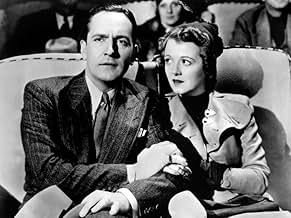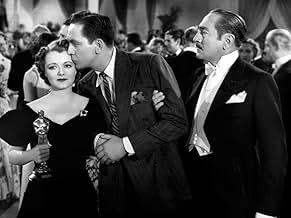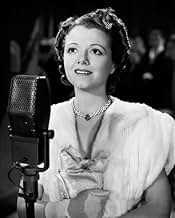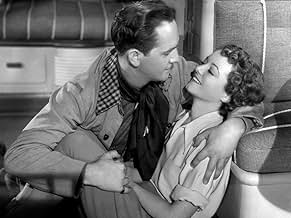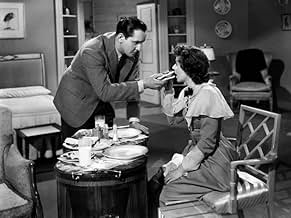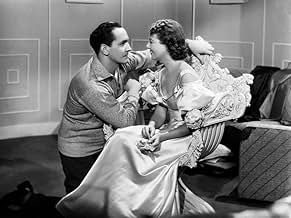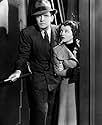AVALIAÇÃO DA IMDb
7,3/10
12 mil
SUA AVALIAÇÃO
Uma jovem chega a Hollywood com sonhos de estrelato, e os realiza apenas com a ajuda de um ator alcoólatra cujos melhores dias ficaram para trás.Uma jovem chega a Hollywood com sonhos de estrelato, e os realiza apenas com a ajuda de um ator alcoólatra cujos melhores dias ficaram para trás.Uma jovem chega a Hollywood com sonhos de estrelato, e os realiza apenas com a ajuda de um ator alcoólatra cujos melhores dias ficaram para trás.
- Direção
- Roteiristas
- Artistas
- Ganhou 1 Oscar
- 7 vitórias e 7 indicações no total
Guinn 'Big Boy' Williams
- Posture Coach
- (as Guinn Williams)
Jean Acker
- Woman at Preview
- (não creditado)
Eric Alden
- Niles' Assistant
- (não creditado)
Irving Bacon
- Station Agent
- (não creditado)
Jane Barnes
- Waitress #1
- (não creditado)
Vince Barnett
- Otto
- (não creditado)
Clara Blandick
- Aunt Mattie
- (não creditado)
Avaliações em destaque
Fredric March gave a magnificent performance, probably the best of his career, as Norman Maine, the actor whose career is in the descendant as that of his wife, Vikki Lester, is in the ascendant in this, the first 'official' version of "A Star is Born", (the 1932 film "What Price Hollywood" roughly told the same story). March displays just the right degree of brashness, of knowingness, and a combination of ego and a real actor's almost complete lack of ego. It's a miraculous piece of work.
As Lester, Janet Gaynor is touchingly blank but the star quality she is meant to display seems conspicuously absent; (in the 1954 musical remake Judy Garland was almost too much a star). It seems inconceivable that she could eclipse March on screen (even with his drinking). If Lester is a star and possibly a great actress Gaynor keeps the secret to herself.
The script for this version was partly written by Dorothy Parker and Alan Campbell and it shows. It's an acerbic and, at times, savage movie about the movies, quite cynical for a major studio picture of it's day. It is very well directed by William Wellman who draws first-rate performances from the supporting cast, in particular Lionel Stander as a heartless, slime-ball studio hack. This remains the best of the three versions to come thus far.
As Lester, Janet Gaynor is touchingly blank but the star quality she is meant to display seems conspicuously absent; (in the 1954 musical remake Judy Garland was almost too much a star). It seems inconceivable that she could eclipse March on screen (even with his drinking). If Lester is a star and possibly a great actress Gaynor keeps the secret to herself.
The script for this version was partly written by Dorothy Parker and Alan Campbell and it shows. It's an acerbic and, at times, savage movie about the movies, quite cynical for a major studio picture of it's day. It is very well directed by William Wellman who draws first-rate performances from the supporting cast, in particular Lionel Stander as a heartless, slime-ball studio hack. This remains the best of the three versions to come thus far.
This early version of "A Star is Born" is well-performed by a good cast, and an interesting story. The basic idea is fairly simple, but filled with potential, and it is done skillfully.
Janet Gaynor and Frederic March work very well as a Hollywood couple whose careers are headed in different directions, with March's performance being especially good. The rest of the cast rounds out the picture nicely with good performances of their own. While the inside look at Hollywood is interesting in its own right, the heart of the story is the way that the couple's marriage and relationships are affected by her career taking off at the same time that his is crashing. It's the kind of story that only works with believable characters, careful writing, and convincing acting, and all of those are present here.
While overshadowed by the lavish 50's remake, this earlier version is still quite worthwhile in its own right.
Janet Gaynor and Frederic March work very well as a Hollywood couple whose careers are headed in different directions, with March's performance being especially good. The rest of the cast rounds out the picture nicely with good performances of their own. While the inside look at Hollywood is interesting in its own right, the heart of the story is the way that the couple's marriage and relationships are affected by her career taking off at the same time that his is crashing. It's the kind of story that only works with believable characters, careful writing, and convincing acting, and all of those are present here.
While overshadowed by the lavish 50's remake, this earlier version is still quite worthwhile in its own right.
When you see this masterpiece, remember that more than 65 years have passed since it debuted on the big screen. How many contemporary films will dazzle and delight in 2065?
Sure, we have seen this story before, but this was the first incarnation. Sure all films are in color today, but notice the rich, full-rigged use of color here, only a decade after talkies began. Dialogue sound familiar, well many of the lines originated here (thanks Dorothy Parker).
First caught this in the movie theatre around 1975 as this David O. Selznick production had been out of circulation. Judy Garland's troubled but ultimately engrossing and hugely entertaining remake was already familiar to me. So how does a classic compare to its first version. To me, it is one of the 1930's masterworks.
How perfect to cast Janet Gaynor in the role, an Oscar winner herself at 20 --- that child-like voice unforgettable. Fredric March, like Gaynor already a star and early Oscar recipient, world weary and helpless. The art deco, lavish production, haunting music, and scene after scene of "behind the scenes Hollywood", well they sure worked for me. "Kitsch" an old friend labeled it, but to me, memorable.
I love watching this movie --- hope you enjoy it as well.
Sure, we have seen this story before, but this was the first incarnation. Sure all films are in color today, but notice the rich, full-rigged use of color here, only a decade after talkies began. Dialogue sound familiar, well many of the lines originated here (thanks Dorothy Parker).
First caught this in the movie theatre around 1975 as this David O. Selznick production had been out of circulation. Judy Garland's troubled but ultimately engrossing and hugely entertaining remake was already familiar to me. So how does a classic compare to its first version. To me, it is one of the 1930's masterworks.
How perfect to cast Janet Gaynor in the role, an Oscar winner herself at 20 --- that child-like voice unforgettable. Fredric March, like Gaynor already a star and early Oscar recipient, world weary and helpless. The art deco, lavish production, haunting music, and scene after scene of "behind the scenes Hollywood", well they sure worked for me. "Kitsch" an old friend labeled it, but to me, memorable.
I love watching this movie --- hope you enjoy it as well.
I believe this as one of the most beautiful pictures I have ever seen. I enjoyed the story, the dialog and above all I enjoyed the atmosphere and the actors. All of them are great but to me Fredric March is outstanding.
Norman/Alfred is a wonderful character: frail, undignified, touchy, weak and able to love Vicki/Esther so much, with all his heart.
Fredric March brings all of it on the screen, providing one of his best performances here.
If you would like to become an actor, I believe you should watch this movie and Mr. March's way of acting. Pay attention to his eyes, his hands, his face and his moves, especially when he interrupts his wife thanking everybody for the Oscar she got and claims he deserves three statues for the worse performances.
He is overcome by himself and starts dying. I just shivered.
To me, this version can't be compared to its remakes. The allure and the fascination of Hollywood have been perfectly represented here, together with an unpleasant and creepy feeling of emptiness.
Norman/Alfred is a wonderful character: frail, undignified, touchy, weak and able to love Vicki/Esther so much, with all his heart.
Fredric March brings all of it on the screen, providing one of his best performances here.
If you would like to become an actor, I believe you should watch this movie and Mr. March's way of acting. Pay attention to his eyes, his hands, his face and his moves, especially when he interrupts his wife thanking everybody for the Oscar she got and claims he deserves three statues for the worse performances.
He is overcome by himself and starts dying. I just shivered.
To me, this version can't be compared to its remakes. The allure and the fascination of Hollywood have been perfectly represented here, together with an unpleasant and creepy feeling of emptiness.
A young country girl named Ester Blodgett (Janet Gaynor) arrives in Hollywood filled with dreams of becoming a famous movie starlet. However, she gets nowhere until she's noticed by famous movie star Norman Maine (Fredric March), a performer on his way down in terms of popular appeal. The two fall in love but just as Ester's star, under the stage name Vicki Lester begins to rise, Maine's begins to fade.
The best thing about this film is the performance given by Fredric March as actor Norman Maine. He nails the inner emotional turmoil going on inside his character and makes him always sympathetic to the viewer even as Maine falls in and out of sobriety. It's Maine's character that proves most interesting to the viewer here as March completely steals the film away from star Janet Gaynor.
Gaynor doesn't prove quite as appealing or convincing in her lead role as Ester Blodgett/Vicki Lester and honestly it's hard to see why the public should favor her so. Maybe this was to symbolize the fickleness of the public in that they should prefer a pretty new face over a talented older one. Who knows? Nevertheless Gaynor just doesn't ever prove as appealing here in her role as she should.
The best thing about this film is the performance given by Fredric March as actor Norman Maine. He nails the inner emotional turmoil going on inside his character and makes him always sympathetic to the viewer even as Maine falls in and out of sobriety. It's Maine's character that proves most interesting to the viewer here as March completely steals the film away from star Janet Gaynor.
Gaynor doesn't prove quite as appealing or convincing in her lead role as Ester Blodgett/Vicki Lester and honestly it's hard to see why the public should favor her so. Maybe this was to symbolize the fickleness of the public in that they should prefer a pretty new face over a talented older one. Who knows? Nevertheless Gaynor just doesn't ever prove as appealing here in her role as she should.
Você sabia?
- CuriosidadesThe first all-color film nominated for an Academy Award for Best Picture.
- Erros de gravaçãoThe Night Court Judge refers to the "commonwealth" of California, but California isn't one of the states with commonwealth status. The judge should have referred to the "state" instead.
- Citações
Grandmother Lettie: If you've got one drop of my blood in your veins, you won't let Mattie or any of her kind break your heart, you'll go right out there and break it yourself.
- Versões alternativasAlso available in black and white
- ConexõesEdited into What's Cookin' Doc? (1944)
- Trilhas sonorasCalifornia, Here I Come
(1924) (uncredited)
Music by Joseph Meyer
(variations in the score as Esther arrives in Hollywood)
Principais escolhas
Faça login para avaliar e ver a lista de recomendações personalizadas
Detalhes
- Data de lançamento
- País de origem
- Idioma
- Também conhecido como
- Nace una estrella
- Locações de filme
- Empresas de produção
- Consulte mais créditos da empresa na IMDbPro
Bilheteria
- Orçamento
- US$ 1.173.639 (estimativa)
- Tempo de duração
- 1 h 51 min(111 min)
- Proporção
- 1.37 : 1
Contribua para esta página
Sugerir uma alteração ou adicionar conteúdo ausente


